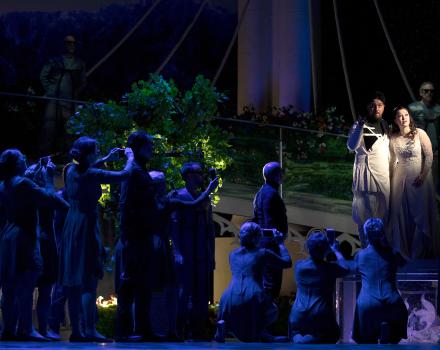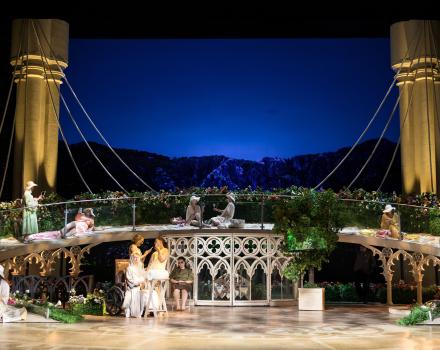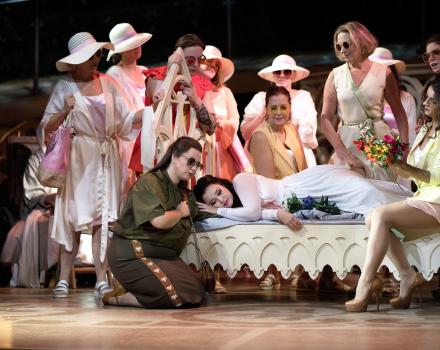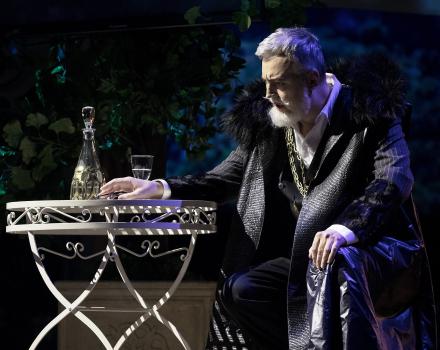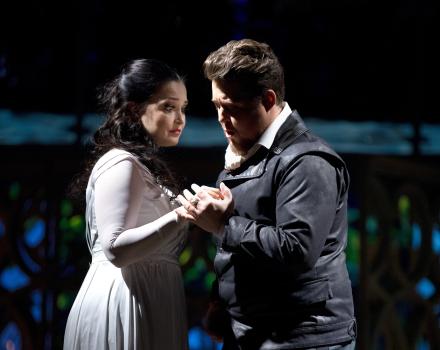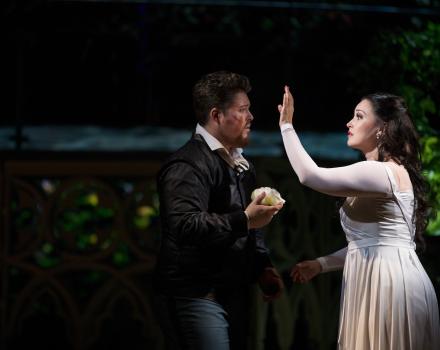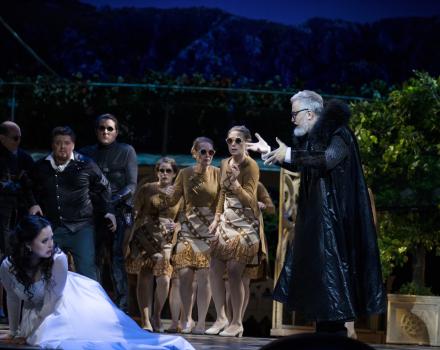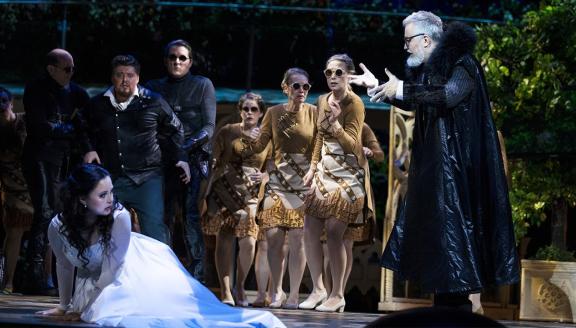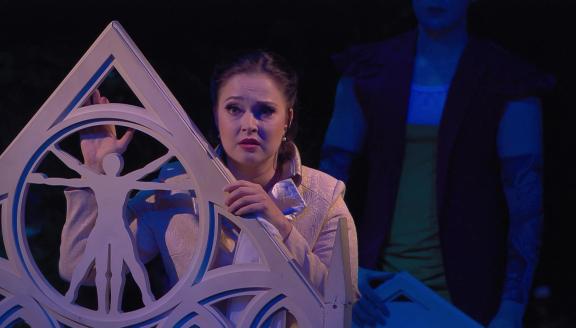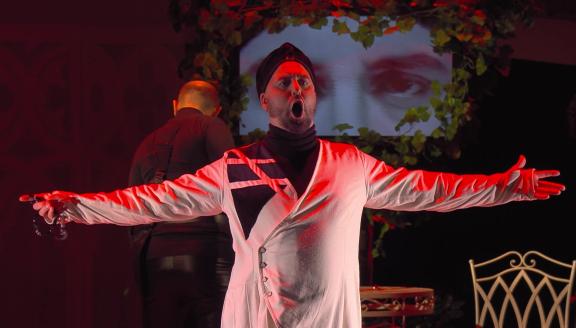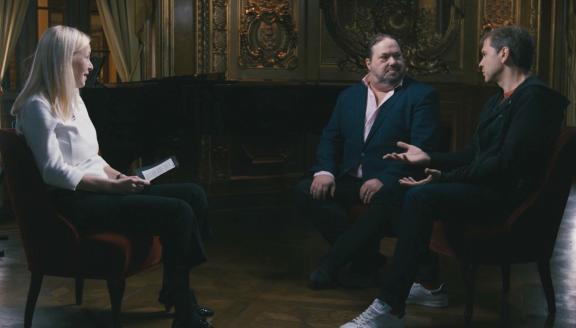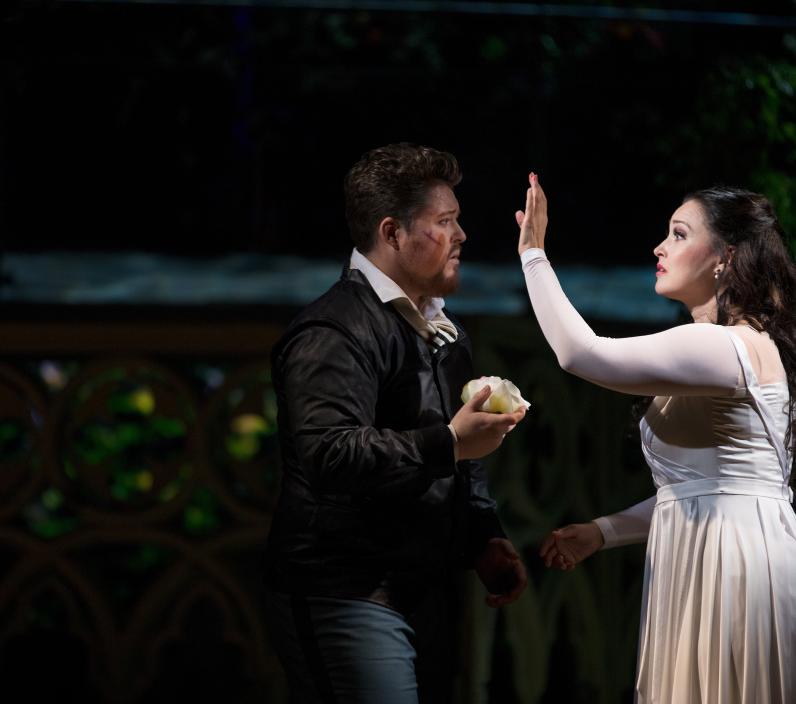

Iolanta

Princess Iolanta’s blindness is a well-guarded state secret that risks sparking another war. When Count Vaudémont falls in love with her and offers to cure her blindness, Iolanta is faced with a choice: to continue as before or live her life in a way she has never experienced.
Director Sergey Novikov moves the story of the king’s blind daughter to our own time when an overpowering wealth of information prevents us from seeing the true beauty of the world. Tchaikovsky’s last opera – at the peak of his career – was much acclaimed at the premiere in St. Petersburg in 1892. A year later, it premiered at Royal Swedish Opera, but the one-act opera has not been performed in Stockholm since then.
Cast
René | Stanislav Shvets |
|---|---|
Jolanta | Olga Shcheglova |
Robert | Konstantin Brzhinskiy |
Greve Vaudémont | Igor Morozov |
Ibn-Hakia | Dmitry Yankovsky |
Alméric | Jonas Degerfeldt |
Bertrand | Lennart Forsén |
Martha | Klementina Savnik |
Brigitta | Vivianne Holmberg |
Laura | Olga Deputatova |
Chorus | Royal Swedish Choir |
Orchestra | Royal Swedish Orchestra |
| ... | |
Music | Pyotr Ilyich Tchaikovsky |
|---|---|
Conductor | John Fiore |
Director | Sergey Novikov |
Sets | Aleksandr Kupalyan |
Lighting | Denis Enyukov |
Costumes | Mariya Vysotskaya |
Text | Modest Tchaikovsky after the play ‘King René's daughter’ by Henrik Hertz |
| ... | |
Video
The story
The story is based on the Danish poet Henrik Herz lyrical play ‘King René’s Daughter’, originally set in a Provençal castle. Opera in one act.
King René’s daughter does not know that she is blind. The king has forbidden anyone to talk about her blindness or make her aware of the visual world. Iolanta is feeling sad without knowing why. Martha and her friends Brigitta and Laura sing to her as she falls asleep. Alméric announces the arrival of the king and the famous physician Ibn-Hakia, who will try to cure Iolanta of her blindness. The doctor says there is nothing he can do unless Iolanta longs to see, so the king refuses. He does not want to expose his daughter to an experiment without knowing the outcome. Iolanta has been betrothed to Robert of Burgundy since she was a child. He arrives at the castle with his friend Vaudémont to break up the engagement because he loves another. When Vaudémont sees Iolanta sleeping he falls in love with her. When she wakes up and he discovers that she is blind, he tells her about the light and everything people around her can see. The king is furious and sentences Vaudémont to death. But a desire for the “unknown” has been awakened in Iolanta, just as the doctor predicted, and she is determined to rescue the man she loves. The doctor is now able to go through with his operation – it is successful and Iolanta can see. The king relieves Robert from his engagement and gives his blessing to Iolanta and Vaudémont.
English translation by Katarina Trodden
Insights
Iolanta stood closest to Tchaikovsky’s heart
In 1891, Pyotr Tchaikovsky received a commission from the Mariinsky Theatre for a ballet and an opera to be performed together. At its premiere a year later, the audience preferred the opera, Iolanta, to the ballet, The Nutcracker. But if the ballet soon came to be loved the world over, the opera has at least retained its popularity in Russia.
Since 1883-84, Pyotr Tchaikovsky has been toying with the idea of writing an opera about Yolanta. Tchaikovsky came across the play King René's Daughter by the Dane Henrik Hertz in Russian translation and immediately became very fond of it. The story enchanted him, as did the poetry, the originality and the abundance of lyrical scenes. It was then that he decided to write music for the play.
But it was only in 1888, when Tchaikovsky attended a student performance at the Malyj Theatre's Speech Stage in Moscow, that it really took off. There he saw the very young actress Yelena Leshkovskaya's student audition. She portrayed a spiritually mature Iolanta, and held the audience spellbound; the composer was on fire. Though somewhere he wondered how the singer of the future opera could match her.
Also present was the director of the Imperial Theatres, Ivan Vsevolozhsky, who also visited the Malyj Theatre. It is likely that they touched on the matter together and discussed a future production, but the actual negotiations did not begin until the end of 1890. By then the commission had been completed with the ballet The Nutcracker. Everything was to be ready for the 1891-92 season.
The work did not go quite as Tchaikovsky had hoped. The ballet got in his way and he didn't like the choice of subject. It was more important that Iolanta should succeed, that the audience should love her, just as he did. To feel the passion beneath the surface, the one he had sensed while reading and had had been confirmed by a certain actress at the Malyj Theatre.Instead, it was toy soldiers, gingerbread and other things that now demanded their music. He decided to start with the ballet, to get it over with.
Work began in the summer of 1891 with the grand duet between Iolanta and Vaudémont, and continued at a brisk pace thereafter. But the creative urge came in waves and Tchaikovsky felt he was repeating himself. The libretto from his brother Modest did not quite inspire him as much as the text of The Queen of Spades, despite its beautiful poetic qualities.
‘Certainly medieval dukes, knaves and ladies could stir the imagination,’ he wrote - ‘but hardly the heart.’ Self-doubt and lack of self-confidence, as so often in the past.
The orchestration was completed at the end of August-September 1891, when Tchaikovsky last laid his hands on the opening prelude. It was a naive, simple and clear story - like a medieval ballad, ending in a hymn of praise to the almighty God, a kind of ‘Deus ex machina’ that sets everything right, and is answered by everyone's infinite gratitude in the final ensemble. Certainly an ending to the Tsar's taste.
The double premiere was performed in December 1892 in the presence of a gracious Alexander III and was a great success, especially the opera. According to the composer, it won the hearts of the audience. Several numbers were interrupted by applause, and there were calls for the duet to be redone.
He had every reason to feel happy, with two favourite artists in the leading roles - the star couple Medea and Nikolaj Figner as Iolanta and Vaudémont, and with the experienced Eduard Nápravník as conductor. Tchaikovsky himself thought The Nutcracker was far too overloaded on stage, but was pleased with the performance as a whole. Many critics liked the ballet more and thought that Iolanta was Tchaikovsky's weakest opera to date, which disappointed him. Although the first performances were sold out, interest gradually waned and the opera disappeared from the repertoire after 11 performances.
As the popularity of The Nutcracker continued to grow, Iolanta was not the success its creator had once expected. After an initial spread, interest waned. In the US, it was only on 10 September 1933 that the opera was performed for the first time, at the Garden Theatre in Scarborough-on-Hudson. In Britain, it had to wait until 20 March 1968 and the Camden Festival in London.
For the Russians, the work lived on, both as a repertory work and in smaller productions across the country, as director Dmitry Chernyakov and soprano Anna Netrebko have proven recently. They have also done their part to give Iolanta a boost into the Western world, along with other fine productions and recordings over the past decade. The mature Tchaikovsky's stripped-down, beautiful melodies, often accompanied by a reductive orchestral sound, have been discovered, with the vocals taking centre stage and in the foreground. It moves the plot forward, clearly and unambiguously.
Nowadays, it doesn't have to be knight-armour and medieval castles on stage as in the past. The chivalry of modern Iolanta is hinted at, while the great emotions are redeemed and portrayed in a new way. A new stage language is available. The directors have a different spiritual and visual imagination, which serves the opera Iolanta's rebirth. It has come to stay.
Adapted from an article by Lars Erik Andrenius.
Gallery
